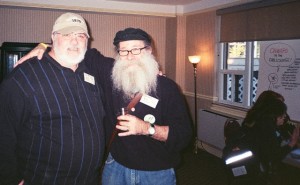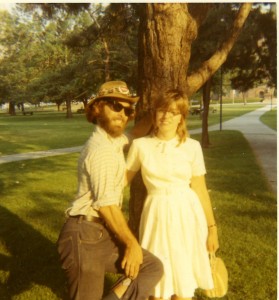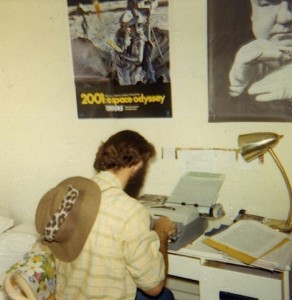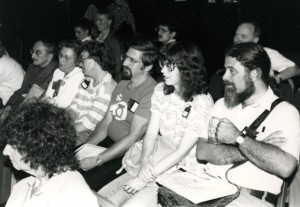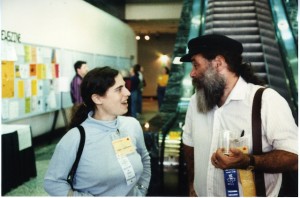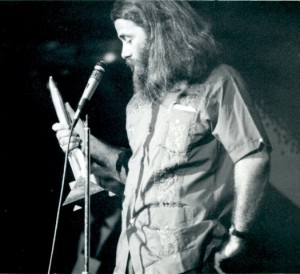The British Fantasy Awards became mired in controversy when Stephen Jones charged a conflict of interest between the administrator and several winners. That prompted a few fans to suggest fixing the BFA by borrowing rules from the Hugo Awards.
The Hugo Awards do have an excellent reputation for avoiding such conflicts, but don’t make the mistake of thinking it’s because of the superior draftsmanship of the rules. The real reason is that over the years many different people have steered clear of conflicts that the rules do not prevent.
What Is a Conflict of Interest? A conflict of interest exists when anyone exploits his/her official capacity for personal benefit.
The Hugo Awards are run under a set of rules that is extremely wary of conflicts of interest. The WSFS Constitution excludes the entire Worldcon committee from winning a Hugo unless these conditions are met:
Section 3.12: Exclusions. No member of the current Worldcon Committee or any publications closely connected with a member of the Committee shall be eligible for an Award. However, should the Committee delegate all authority under this Article to a Subcommittee whose decisions are irrevocable by the Worldcon Committee, then this exclusion shall apply to members of the Subcommittee only.
To avoid disqualifying the whole Committee – upwards of 200 people, most having nothing to do with the Hugos – the Worldcon chair generally appoints the fans who count the votes and apply the eligibility rules to a Subcommittee. So if some minor member of the concom wins a Hugo, as I did while serving as editor of L.A.con II’s daily newzine in 1984, it’s no problem.
From the beginning the WSFS Constitution (1962-1963) has banned all committee members from eligibility for the Hugos. To my knowledge, the rule was modified in the 1970s by adding the option of an autonomous Subcommittee. People thought it should have been unnecessary for Mike Glicksohn to resign from the TorCon 2 (1973) committee rather than forego the chance for his and Susan Wood Glicksohn’s Energumen to compete for the Hugo, which they indeed won.
The modified rule has worked to everyone’s satisfaction for a number of reasons having little to do with its precision. Worldcons once were commonly led by people also involved with Hugo contending fanzines, which has rarely happened in the past 40 years. On those rare occasions the people involved have taken it upon themselves to avoid any conflicts.
For example, many fans involved with running Noreascon Three (1989) wrote for The Mad 3 Party in the years leading up to the con. Edited by Leslie Turek, TM3P was nominated for Best Fanzine in 1988, withdrawn in 1989, and won a Hugo in 1990. Noreascon Three did appoint a Hugo Subcommittee, of unassailable integrity — in my mind, if TM3P had competed in 1989 and won a Hugo there would have been no reason to doubt the result. The committee, however, felt they needed to go beyond what was required in the rules to preserve an appearance of fairness and TM3P was withdrawn.
When I chaired L.A.con III (1996) friends reminded me that I could remain eligible for a Hugo by delegating responsibility for the awards to a Subcommittee. I felt invested in and responsible for everything that was happening with the con, so for me it was never an option to act as if the Hugos weren’t a part of that. I did appoint a Subcommittee – and put myself on it, announcing that I was withdrawing from the awards for 1996.
So the anti-conflict rule works because people make it work. It is not an infallible rule. In fact, I agree with a comment made by drplokta on Nicholas Whyte’s From the Heart of Europe that it would be hypothetically possible for something similar to this year’s BFA situation to play out in the Hugos without violating the rule.
[Hugo Subcommittee members’] partners are eligible though, and I guess if a Hugo subcommittee member ran a publishing house then the books that they publish would be eligible, since the nomination would be for the author and not for the publisher.
In short, it’s a good rule to have, but it’s not all-encompassing as some have assumed in recommending it to fix the BFAs.
The Hugo Awards Conflict of Interest Trivia Quiz: When I made my decision to withdraw in 1996 I doubted that other Worldcon chairs had ever faced the same choice. But they did. I’ll share what I’ve discovered in the answers to this two-question trivia quiz.
Question 1: How many times has the chair of the current year’s Worldcon won a Hugo?
(a) Once
(b) Twice
(c) Never
There’s been such controversy about the chair of the British Fantasy Society’s close association with 5 of this year’s award winners — for example, he is a partner in the publisher that won Best Small Press – that you’d have to assume it would be impossible for a Worldcon chairman to win a Hugo at his own con without raising a historic stink, right? Wrong.
Answer to Question 1: Once. Loncon I (1957) was chaired by Ted Carnell. The winner of the Hugo for Best British Professional Magazine was New Worlds edited by John Edward Carnell. The same person.
Ted Carnell is the only chair to win a Hugo at his own Worldcon. And it appears everyone was content. Harry Warner’s history of Fifties fandom, A Wealth of Fable, doesn’t contain the least hint of controversy. Neither do any of the conreports from Loncon I collected on Rob Hansen’s website.
Sometimes in the award’s early days the chair of the Worldcon administered the Hugos and counted the votes. That may not have been the case in 1957. The progress reports directed members to send their Achievement Award ballots to the convention secretary Roberta Wild. The chair winning a major award might still have been questioned but I’ve found no record of any complaint. In all my time in fandom I’ve never heard anybody say a bad word about that having happened.
Ted White, the 1967 Worldcon chair who responded to some questions for this article, agrees: “I have never heard anyone say anything disparaging about it either. It was a bit too obviously deserved. Fandom was a lot smaller then, and even smaller in the UK. Carnell wore several hats. I met him in 1965. A quiet, unassuming, gentle and generous man.”
Question 2: How many times has a Worldcon chair won a Hugo the year before or after their con?
(a) 2
(b) 4
(c) 8
Answer to Question 2: 4 times.
Many Worldcon chairs and their committees were connected with award-winning fanzines over the years. Before the Internet that was the best medium for building fannish communities and wooing voters.
(1) Wally Weber was a co-editor of Cry of the Nameless, the Best Fanzine Hugo winner in 1960, the year before he chaired Seacon (1961). Cry was not a nominee in 1961 but was back as a finalist in 1962. So was the zine kept out of contention the year they hosted the Worldcon? Wally Weber isn’t certain but he thinks they might have:
As for the 1961 Hugos, I remember a discussion and decision that Cry be disqualified due to the unusually large percentage of the eligible voters being from the Seattle area and who had never read a fanzine other than Cry. Unfortunately my memory is often more creative than accurate and I have no documentation to back that up. I do not even remember who participated in making the decision. I don’t even remember how the voting was done or who counted the ballots. Did we have official ballots? I would think such a decision would have been mentioned in one of the progress reports if, indeed, there actually had been such a decision. Maybe votes for Cry were just discarded during the counting processes.
(2) The 1961 fanzine Hugo winner was Earl Kemp’s Who Killed Science Fiction. The next year Kemp chaired Chicon III (1962). However, as I’m sure you already know, Who Killed Science Fiction was the most famous one-shot in the history of sf. It obviously wasn’t a factor in the Hugos when he chaired the Worldcon.
(3) George Scithers chaired Discon I (1963) in Washington, D.C. He edited Amra from 1959 to 1982. It won the Hugo in 1964. Since it had never been nominated for the Hugo in any prior year it’s difficult to guess whether he took any special steps to keep it off the ballot when he chaired the Worldcon in 1963. None of the committee members who might know are still with us – Scithers, Bob Pavlat and Dick Eney. One thing we do know is that he wouldn’t have permitted his zine to be placed on the ballot because he’s one of the people who helped write the anti-conflict rule into the original WSFS Constitution of 1962-1963.
(4) Ted White co-chaired NyCon 3 (1967), the Worldcon which originated the Best Fan Writer and Best Fan Artist Hugos. He also worked for F&SF at the time. Ted says: “F&SF withdrew itself; this was not a NyCon3 committee decision. Ed Ferman [the editor] had a nice sense of propriety.”
Ted says he didn’t take any steps to stay off the ballot in the fan categories the year he chaired the Worldcon. “I did not withdraw myself from the Fanwriter category (nor make any announcements to that effect) because I did not regard it as necessary. I wasn’t nominated that year, obviating the question. My win the following year surprised me.” However, he probably did not need to make any announcement: people would have been aware of the anti-conflict rule in the Constitution.
White and F&SF both won Hugos the following year, 1968.
[Special thanks to Robert Lichtman and Ted White, as well as Darrell Schweitzer, Peggy Rae Sapienza, Michael J. Walsh, Elinor Busby and Wally Weber for their assistance in researching this article.]

